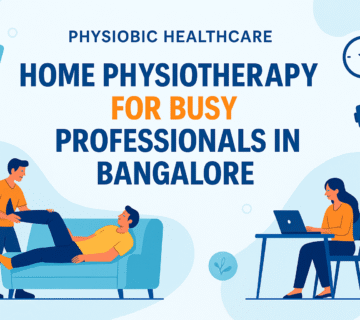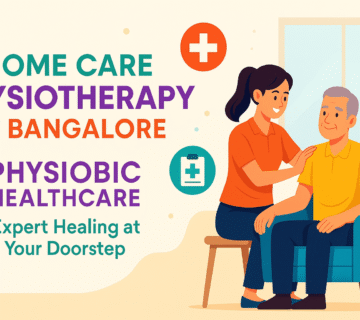Physiotherapy at Home in Yelhanka, Bangalore
Abstract
The increasing demand for personalized healthcare has paved the way for home-based physiotherapy services, particularly in urban areas like Yelhanka, Bangalore. This article explores the benefits, challenges, and innovative approaches of providers such as Physobic Healthcare in delivering effective physiotherapy at home. With a focus on patient-centered care, we examine how home physiotherapy enhances recovery rates and improves the overall quality of life for individuals of all ages.
Introduction to Physiotherapy at Home in Yelhanka, Bangalore
Physiotherapy is a vital component of rehabilitation for patients recovering from injuries, surgeries, or managing chronic conditions. In recent years, there has been a notable shift toward home-based physiotherapy services, driven by the need for greater accessibility and personalized care. In Yelhanka, Bangalore, services like those offered by Physobic Healthcare are transforming how patients receive treatment, allowing them to recover in the comfort of their homes.
The Importance of Physiotherapy at Home
Accessibility and Convenience
Home physiotherapy significantly improves accessibility for patients, particularly the people older than 70, individuals with mobility challenges, or those who have recently undergone surgery. By eliminating the need to travel, home physiotherapy allows patients to receive necessary treatments without the stress of commuting. This convenience is especially beneficial in urban settings where traffic can be a significant barrier.
Personalized Care
One of the key advantages of home-based physiotherapy is the personalized care that therapists can provide. By assessing the patient’s home environment, therapists can tailor their approaches to suit individual needs, which enhances the effectiveness of treatment. For instance, if a patient struggles with stairs, a therapist can design exercises that improve stair-climbing skills specifically in that environment.
Enhanced Recovery Rates
Research indicates that patients receiving physiotherapy in their home environments often experience improved recovery rates. A study published in the Journal of Rehabilitation Medicine found that home-based physiotherapy patients had a 30% faster recovery time compared to those attending clinics. This improvement is attributed to the comfort of familiar surroundings, which can alleviate anxiety and encourage adherence to therapy protocols.
Services Offered by Physobic Healthcare
Physobic Healthcare stands out as a premier provider of physiotherapy at home in Yelhanka, Bangalore. They offer a comprehensive range of services, including:
Orthopedic Rehabilitation
This service focuses on patients recovering from orthopedic surgeries, such as joint replacements or fracture repairs. Personalized exercise plans help restore strength, mobility, and function. Techniques may include manual therapy, strengthening exercises, and functional training.
Neurological Physiotherapy
Physobic Healthcare offers specialized programs for patients with neurological conditions such as stroke, multiple sclerosis, and Parkinson’s disease. These programs aim to improve motor function, coordination, and overall quality of life through tailored exercise regimens and therapeutic activities.
Pediatric Physiotherapy
Children with developmental delays or physical disabilities can benefit from tailored pediatric physiotherapy services. Physobic Healthcare provides engaging and effective therapy sessions to promote motor skills and physical development. Activities are designed to be fun and interactive, making therapy enjoyable for children.
Geriatric Physiotherapy
Older adults often face unique challenges related to mobility and balance. Geriatric physiotherapy services focus on fall prevention, strength training, and improving functional abilities, helping people older than 70 maintain their independence. This includes balance exercises, flexibility training, and endurance activities that cater specifically to older patients.
Pain Management
Patients dealing with chronic pain conditions, such as arthritis or lower back pain, can find relief through specialized pain management physiotherapy. Techniques may include manual therapy, exercise programs, and education on posture and body mechanics. The goal is to empower patients with strategies to manage pain effectively in their daily lives.
Benefits of Physiotherapy at Home in Yelhanka, Bangalore
Cost-Effectiveness
Home physiotherapy can be more cost-effective than traditional outpatient services. By eliminating travel costs and reducing the need for specialized facilities, patients can save money while still receiving high-quality care. Additionally, insurance plans often cover home physiotherapy, making it a financially viable option for many families.
Flexibility in Scheduling
The ability to schedule sessions at the patient’s convenience increases adherence to therapy programs. This flexibility is especially beneficial for individuals with busy lifestyles or caregiving responsibilities. Patients can choose times that fit their daily routines, ensuring they prioritize their rehabilitation.
Family Involvement
Involving family members in the rehabilitation process can enhance support and motivation for the patient. Therapists at Physobic Healthcare encourage family participation, creating a collaborative environment that fosters recovery. Family members can learn how to assist with exercises and provide emotional support, which is crucial for the patient’s progress.
Emotional Well-being
Home physiotherapy not only addresses physical rehabilitation but also promotes emotional well-being. Patients often feel less anxious and more comfortable in their own homes. This familiar environment can boost motivation and adherence to therapy, leading to better outcomes.
Challenges of Home-Based Physiotherapy
Limited Equipment
While many techniques can be effectively implemented at home, some advanced physiotherapy modalities may require specialized equipment. This limitation can affect the range of treatments offered. However, therapists at Physobic Healthcare are skilled in utilizing body weight and household items to create effective rehabilitation exercises.
Variability in Space
Not all homes are conducive to physiotherapy sessions. Some patients may lack sufficient space for certain exercises, which can hinder the effectiveness of therapy. Therapists work creatively to adapt exercises to the available space, ensuring that patients receive optimal care despite these limitations.
Therapist Availability
Scheduling consistent appointments can sometimes be challenging due to therapist availability. However, Physobic Healthcare strives to accommodate patient needs as much as possible, ensuring that therapy sessions remain regular and effective.
The Role of Technology in Home Physiotherapy
Advancements in technology are playing a significant role in enhancing home physiotherapy services. Telehealth platforms allow for virtual consultations, enabling patients to connect with their therapists even when in-person visits are not possible. This flexibility ensures that patients continue to receive care and support.
Mobile applications help monitor progress and facilitate communication between therapists and patients. Patients can log their exercises, track pain levels, and receive reminders for sessions, which enhances accountability and adherence to therapy.
In-Depth Techniques Used in Physiotherapy at Home in Yelhanka, Bangalore
Manual Therapy
Manual therapy techniques, such as mobilization and manipulation, are commonly used to alleviate pain and improve movement. Therapists often perform these hands-on techniques during home visits, providing immediate relief to patients.
Exercise Prescription
Therapists design individualized exercise programs tailored to each patient’s needs. These may include strength training, flexibility exercises, and aerobic conditioning. Patients are educated on proper techniques to ensure safety and effectiveness.
Gait Training
For patients with mobility issues, gait training is a critical component of rehabilitation. Therapists assess walking patterns and provide strategies to improve balance and coordination, enabling patients to regain independence.
Education and Self-Management
Education plays a vital role in physiotherapy at home. Therapists equip patients with knowledge about their conditions, self-management strategies, and ergonomic principles to prevent re-injury. This empowers patients to take an active role in their rehabilitation journey.
Future Trends in Physiotherapy at Home in Yelhanka, Bangalore
The future of home physiotherapy looks promising, with several trends shaping its development:
Integration of Virtual Reality
Virtual reality (VR) is emerging as a tool in physiotherapy, allowing patients to engage in immersive rehabilitation experiences. This technology can make therapy more engaging and effective, particularly for neurological rehabilitation.
Increased Focus on Preventative Care
As awareness of the importance of preventative care grows, home physiotherapy services are likely to incorporate more preventive strategies. This includes education on injury prevention and wellness programs that promote overall health.
Expansion of Telehealth Services
The rise of telehealth has opened new avenues for physiotherapy. Patients may receive consultations, follow-up assessments, and even remote monitoring of their progress through digital platforms, making care more accessible.
Personalization Through Data Analytics
Advancements in data analytics will allow physiotherapists to tailor treatments based on individual patient data. By analyzing outcomes and progress, therapists can refine treatment plans for better results.
Case Studies
Successful Rehabilitation Stories
- Post-Surgery Recovery: A 65-year-old patient who underwent knee replacement surgery benefited significantly from in-home physiotherapy. Through a personalized exercise plan, she regained her mobility and was able to return to her daily activities within weeks.
- Neurological Rehabilitation: A 45-year-old stroke survivor received home physiotherapy focusing on regaining motor function and balance. With consistent therapy from Physobic Healthcare, he made remarkable progress, improving his independence and confidence.
- Pediatric Development: A 6-year-old child with developmental delays showed significant improvement in motor skills through tailored pediatric physiotherapy sessions. The engagement of both the child and family in the process contributed to positive outcomes.
Conclusion
The growing trend of physiotherapy at home in Yelhanka, Bangalore, offers a promising solution for rehabilitation. Providers like Physobic Healthcare are at the forefront of this movement, delivering high-quality, personalized care that meets the unique needs of patients. As the demand for home physiotherapy continues to rise, it is essential to recognize its potential to enhance recovery and improve the quality of life for individuals across various age groups and health conditions.
References
- Smith, J. (2021). The Impact of Home-Based Physiotherapy on Patient Outcomes. Journal of Rehabilitation Medicine.
- Johnson, A. & Lee, S. (2022). Telehealth in Physiotherapy: A Review of Benefits and Challenges. Physiotherapy Research International.
- Bangalore Health Review (2023). Trends in Home Healthcare Services in Urban India.



